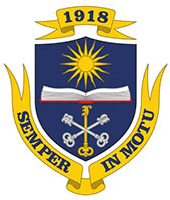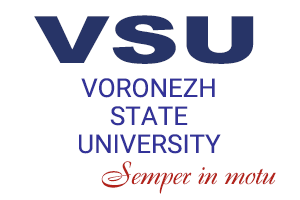On 25th September, in the framework of the III regional mediaforum "Regional press under crisis: how to be a winner" a meeting of the Deputy Minister of Communications and Mass Media of the Russian Federation Aleksey Volin and the Vice-Director of the Department of Communications and Mass Media of the Voronezh Region Ilia Sakharov with students, academic staff and representatives of regional Media took place in the auditorium of the main building of Voronezh State University.
The Rector of VSU Dmitry Endovitsky made a welcome speech and then turned the floor over to Aleksey Volin who gave an overview of the situation at the mediamarket:
'A lot of attention has been paid to young specialists' training recently. That is why I would like to say a few words about what the employer expects of a journalist who just starts his/her career today. They want to see a well-educated, broad-minded, and well-read person with basic knowledge and ability to handle information and social skills. It means that future journalists have to be very careful when choosing the educational institution to study at. If you study at a prestigious university you form a network of people you know. Additionally, the employer wants the young specialist to do a practice training or an internship at his/her company. It provids an opportunity for mutual assessment: the employer assesses you and you assess the company. Employment is a two-sided process – you have to decide for yourself if you are ready to work with these people in these conditions. It is very important to understand that most of all employers dislike over-high expectations. You have to be ambitious, eager to develop rather that expect to get everything at once. A few more tips: be optimistic, hard-working and create an image of a lucky person. As for education, I am very pleased to see positive changes in favour of multifunctionality because the more things you can do, the more valuable you are for an employer'.
The talk was followed by questions from the audience.
'Today almost every educational institution has a faculty of journalism. Don't you think that we have too many journalists for our country?"
"That is right. There is a problem of overabundance of journalists. Universities open faculties of journalism because there are a lot of students who want to study there. However, it is true that it does not mean that all graduates will work as journalists. Some people believe that state financing of journalists training should be limited and a number of media and TV companies are thinking of introducing their own commercial courses. For example, there has been such a practice in cinema business'.
'During Vladimir Pozner's open lecture at VSU it was said that journalism is not a profession and all the faculties of journalism should be closed. What do tou think of that?'
'Journalism is a profession. You accomplish specific work and get money for it, and the idea of closing the faculties is quite provocative. However, you have to understand that the faculty of journalism is not the only place where you can study journalism. What is more, many media managers of today did not graduate from them. You have to understand peculiarities of the journalistic education: journalists have to be able to deal with any topic even if it is unfamiliar to them rather than just serve as a "microphone stand"'.
'In your opinion, how does Media influence the investment environment in the region?"
"Media contributes a lot to image-making. However, the image is not the most important thing for businesses to judge how favourable or unfavourable the region's investment environment is. Yet, Media can help to emphasize favourable aspects'.
'Can you give any tips to university press-centres: should they just inform the public about what is going on or should they be proactive and create coverage opportunities?'
'Of course, you have to create your own agenda and be proactive. Press-centres always have to be one step ahead'.
'Today multimedia journalism is developing very fast: articles are supported with infographics and illustrations. Can you comment on such a tendency and do you think it should be taught to students at the faculty of journalism?"
"It is absolutely necessary to be taught to students. No media can do without multimedia today and this is the main tendency of the modern mediamarket. We understand quite well that a newspaper should have a website. At the same time it should not be a complete copy of the paper version. You have to keep in mind that online version should be adapted for mobile devices. The user is overexposed to information, therefore we have to apply diagrams and illustrations that can attract attention of the audience.'
'It happens that focus on multimedia pushes a well-written text to the background. How can we handle this problem?'
'The focus should be on the text, the readers and their needs rather than on multimedia functions. Every text has its reader and in this way it is very similar to a product that has its own consumer. If your reader is on Twitter he is not ready to read long texts. The journalist has to provide appropriate interpretation and make the story interesting and clear for the reader.'
'A lot of online media is appearing today. Is there a strategy aimed at supporting paper media?'
'I can say for sure that we do not support the weak. If speaking about the strategy of developing paper media, it is aimed at helping paper media find its own audience and attract its readers. We have already discussed it today: it is more convenient to read long articles on a paper media and there are also premium class magazines that are more convenient to read in a paper version. The goal of paper Media is to find its niche and offer things that can not be offered by online versions.




















